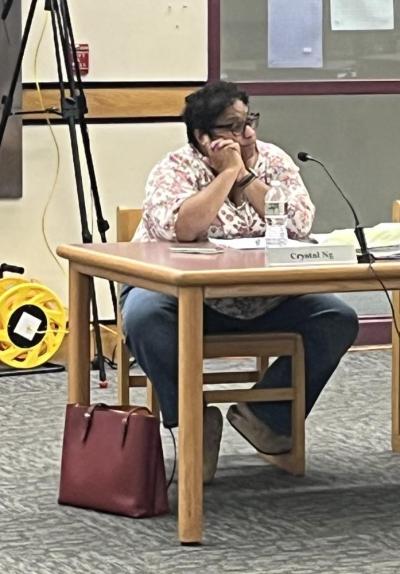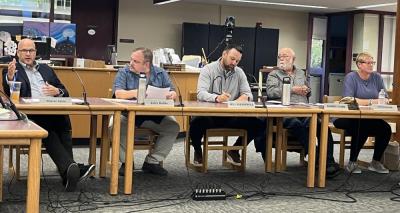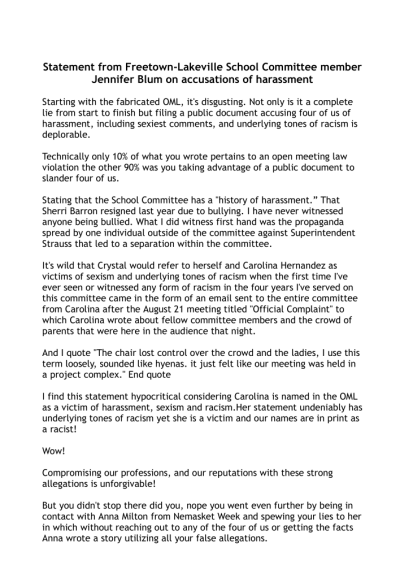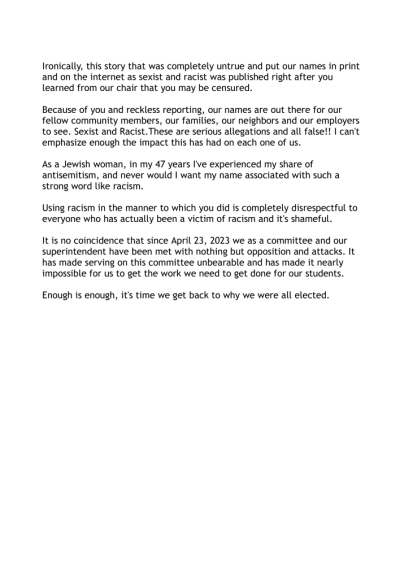Ng censured by School Committee after leaking confidential student information
LAKEVILLE — The Freetown Lakeville School Committee voted to publicly censure member Crystal Ng for sending confidential information about a student to a member of the general public.
“I don’t know how I can go into negotiations with teachers and make sure that information is staying in the room,” said School Committee Vice Chair Will Sienkewicz.
This vote set the tone for the committee’s Wednesday, Sept.4 meeting, which was the first time committee members met face-to-face following Ng’s filing of an Open Meeting Law Complaint on Aug. 20 in which she accused members Sienkewicz, Jennifer Blum, Robert Clark and Stephen Sylvia of making “sexist” comments with “underlying tones of racism.”
Angrily denying Ng’s accusations, members called them “false,” “obnoxious” and “offensive.”
“In my 44 years serving this town, I have never seen so much divisiveness,” said Clark in a written statement he prepared for the meeting.
Members repeated that these accusations were veiled under “the guise of an Open Meeting Law Complaint,” — the majority of which, “has no credibility” according to Sienkewicz.
“Technically, only ten percent of what you wrote pertains to an open meeting law violation, the other 90% was you taking advantage of a public document to slander four of us,” said Blum, who had also prepared a written response.
The part of the complaint that pertained to Open Meeting Law violations, which stated the committee had met in executive session on July 31 under false pretenses and that meeting minutes had not been available for the session, among other claims, were separately discussed.
The committee acknowledged that the executive session discussion probably did stray from what was listed on the agenda but noted that the minutes had not been immediately available because the committee had not yet voted to approve them. The minutes are now available.
As for the accusations, School Committee Chair John Burke stated that “not once” had he heard sexist or racist remarks expressed by anyone on the committee, a sentiment that was expressed several times in the discussion, by members named and unnamed in the complaint.
“‘Sexist’ and ‘racist’ are two words I never want to be associated with,” said Blum, who added that the impact these allegations have had on the professions and reputations of the accused is “unforgivable.”
“I never thought I would have to be in a position where I would have to defend myself against these allegations,” said member Stephen Sylvia.
The matter that drew the censure vote, which also removed Ng from all subcommittee positions, was Ng’s admission that she forwarded materials containing private information about a student to a member of the general public. This information was included in a packet of materials emailed to the School Committee from Superintendent Alan Strauss as part of his evaluation.
An investigation into the emails Ng sent is ongoing, and members of the committee suggested the Open Meeting Law Complaint was filed as a form of retaliation.
“Let’s connect the dots here,” said Will Sienkewicz.
The committee is working to draft a formal response to the complaint that will be sent to Ng and the Attorney General’s office.
Ng, who remained largely silent during the meeting, made clear her intention to stay on the committee. “I am not resigning,” she said.
Publisher’s note:
Nemasket Week regrets our initial handling of Crystal Ing’s Open Meeting Law complaint. We received a copy of the complaint as deadline neared and made a hasty decision to publish the story without comment from any member of the Freetown-Lakeville School Committee — despite the fact that Ng accused four fellow committee members of sexist and racist behavior.
We have since sought to obtain and publish other committee members’ vociferous denials of improper behavior. Not doing that in the first place with a mistake.
Without making any excuse for our mistake, please consider that reporters and editors make dozens of quick decisions every day: Should we cover that meeting? Which quote should I use in this feature story? Does that story need to be shortened? Do I need to check the spelling of that name? Does this photo need to be cropped? Etc.
On most days, we get most of the answers right. And some “wrong” answers have little consequence. Is any harm done if a photo would have looked better with a tighter crop? But when we get it wrong and there are human consequences, we owe it to readers to say we are sorry. And we are sorry.















